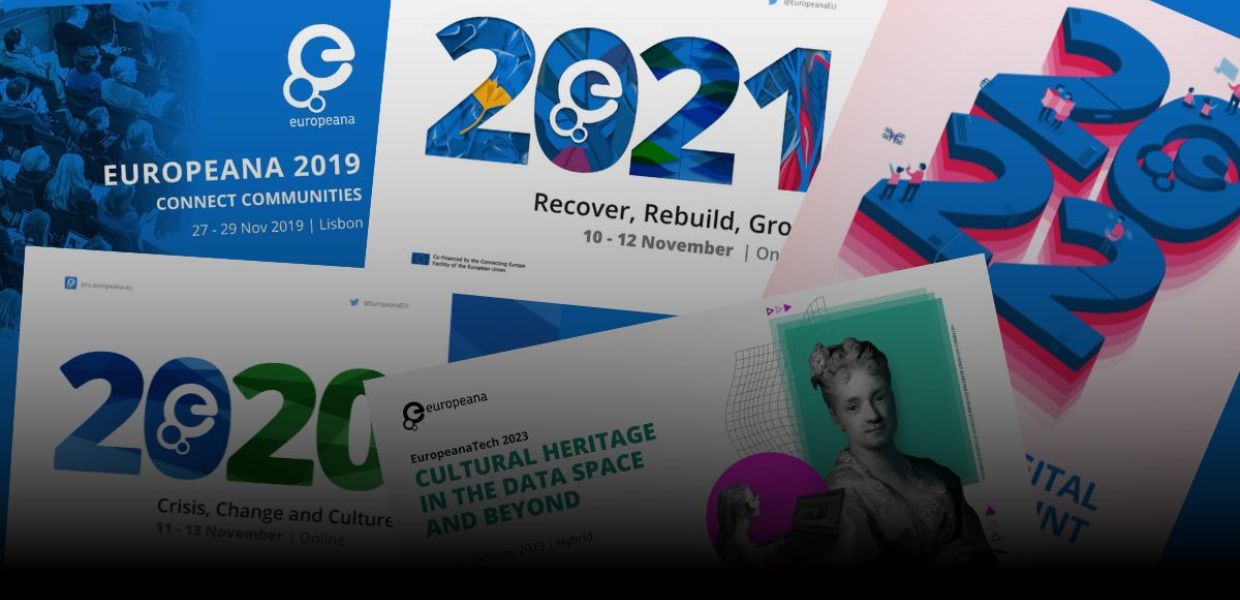Europeana 2025
Europeana 2025 - our annual, flagship conference for professionals, students and policymakers working in, with and around cultural heritage - will take place on 11-12 June 2025 under the patronage of the Polish Presidency of the Council of the EU.
This hybrid conference is organised in collaboration and partnership with the Ministry of Culture and National Heritage of Poland, the National Institute of Cultural Heritage and the POLIN Museum of the History of Polish Jews in Warsaw, who will host the conference.
We are looking forward to convening our sector to meet, learn and exchange over two days in Warsaw and online, and are busy designing an engaging conference programme which showcases the innovative work taking place across the common European data space for cultural heritage - and beyond.
We want this programme to be diverse and inclusive and reflect the topics that matter most to professionals across the sector. With that in mind, we are delighted to open this call for proposals for the conference.
The themes
Our call for proposals for sessions and interventions to be held during Europeana 2025 focuses on the themes of Preserve, Protect and Reuse. Find out more about what these themes encompass, and the topics we want to explore through them, below.
Preserve
Digital technologies offer exciting possibilities to preserve cultural heritage, allowing future generations to enjoy, learn and benefit from it. But preservation does not only relate to physical heritage; in a digital era, it also means making sure digital materials remain accessible over time. Sustaining and maintaining digital repositories and infrastructures to ensure the longevity, continuity and accessibility of digital cultural heritage online and in the data space.
Under this conference theme, we are interested in receiving proposals related to:
Technical solutions and approaches which preserve and enrich cultural heritage data in the common European data space for cultural heritage
Developments which ensure permanence, persistence and sustainability of cultural heritage data in the data space
Innovative examples of how artificial intelligence and 3D technologies are being used to preserve tangible and intangible heritage, and digital practices
Collaborations which seek to preserve and build connections between data from different sectors and industries for its maintenance and preservation
Protect
Cultural heritage is vulnerable to the passage of time, the destruction of war and the effects of climate change. While we seek to preserve our cultural heritage, we also need to take active steps to protect it and the digital processes which underpin it; and ensure the cybersecurity of the cultural heritage sector. This is a key priority of the Polish Presidency, and crucial as we look to build a robust and secure data space which offers participants control of their own data. Europeana 2025 supports Poland’s candidacy to the UNESCO World Heritage Committee ‘United for the Protection of Heritage’, referring to its commitment to international cultural cooperation and heritage preservation.
Under this conference theme, we are interested in receiving proposals related to:
Innovative solutions and digital approaches to protecting heritage at risk from threats such as climate change, confit and illicit trafficking. We are particularly interested in giving a platform to the inspiring work of colleagues working to preserve the cultural heritage of Ukraine.
The use and protection of personal data made available through the common European data space for cultural heritage (within cultural heritage data and metadata)
Examples of how artificial intelligence is being used to protect tangible and intangible heritage.
Activities to protect and strengthen the cybersecurity of cultural heritage institutions and data infrastructures
Examples of how cultural heritage institutions, professionals and collections can foster digital and media literacy, enabling users to engage with digital content critically and responsibly, countering disinformation and fake news.
Reuse
Digital cultural heritage is a shared public good, and should be open for all to enjoy and benefit from. Encouraging its reuse for education, enjoyment, research and creativity, as well as in other industries like tourism and media, brings cultural heritage to new audiences and sharpens the innovation and competitiveness of our sector. The Europeana Public Domain Charter sees a thriving and healthy public domain as essential to the social and economic well-being of society. Advocating for open access and non-restrictive copyright practices is key to enable and support this reuse for generations to come.
Under this conference theme, we are interested in receiving proposals related to:
Stories of how cultural heritage data from the data space has been reused for tourism, education, research and the creative industries, and how it could be reused in other data spaces.
Examples and learnings of how advanced tech has reused cultural heritage data in, for example, augmented and virtual reality, and digital 3D experiences.
Approaches to managing the reuse of cultural heritage data by Artificial intelligence (for example, through data mining) and the implications for cultural heritage institutions in permitting or disallowing this.
How cross-sectoral collaboration between different sectors and data spaces is supporting the reuse of cultural heritage data and content, in particular in a research context.
How to apply
To submit your application please read the detailed information on our call for proposals page and then complete our application form by 11 March 2025.
We can’t wait to read your proposal!
This article was updated on 17th February 2025 to reflect an extension of the deadline to 4 March 2025; and 4 March 2025 to reflect a further extension to 11 March 2025.


